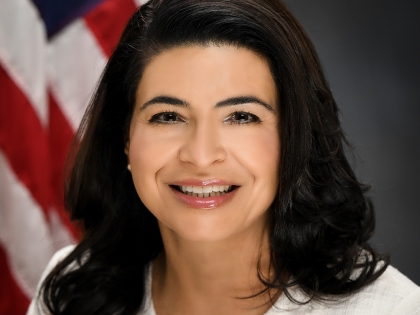
The revolution in my life: How Iranian upheaval changed everything for one Jewish family in Tehran

Senator Anna M. Kaplan, front and center, aged 3, with her family in Iran
I can still remember sitting with my family in our home in Tehran, watching his arrival on our small TV. After a year marked by constant unrest, demonstrations in the streets, and riots ending with gunfire and bloodshed, Ayatollah Khomeini returned to Iran after 14 years in exile, greeted by millions of supporters who had shown up to welcome him at the airport in Tehran.
I was just 13 years old at the time, and while I realized the significance of the events taking place, I don't think I could have fully realized the impact that moment would have on the course of my life. Forty years ago today my family was in the throes of a transition that would result in us leaving behind everything we had ever known.
Before the revolution, Tehran was a modern, secular city. My family had moved there from Tabriz, a small city in the west, when I was 5 years old to be part of a larger community of Persian Jews. And while there were occasional reminders of our minority status in the predominantly Muslim country, we led a relatively low-key existence, enjoying all the benefits of our contemporary society.
That all then began to change. The riots started out slowly. Over time, the sounds of people chanting in the street started to mix with the sound of gunshots, and both quickly became a regular part of life that would follow you at all hours of the day and night.
We tried to go on living our lives, but with the situation quickly unraveling, maintaining a safe existence was becoming a challenge. Every day I would walk through the riots to the Jewish day school where I attended ninth grade, only to be sent home an hour later because they couldn't guarantee our safety.
As many of my classmates fled to the United States, Great Britain and Israel with their families, I had hoped that ours wouldn't be far behind. It was a huge decision for my parents to uproot our family from our ancestral home, abandoning all our possessions and our way of life, and it was one that they were not at first prepared to make.
That changed on Feb. 11, 1979; the success of the Islamic Revolution was declared and the armed forces came under the control of the revolutionary authorities. It quickly became apparent that the place we called home for generations was no longer a safe place for us to live our lives, and the situation would only get worse with each passing day.
By the end of April, left with few options to ensure the safety of our family, my parents sat down with me and my brother and told us that they were sending us to the United States with other children from our community. They assured us that they wouldn't be far behind, and that we would wait there for them until they could find safe passage themselves.
One week later, I boarded a plane with 39 other children and said goodbye to my home forever. It would take two more years for my parents to finally reach the United States, but eventually we were all together again, beginning a new journey together in the country that we now called home.
Like so many Persian Jewish families, the only connection we have left to Iran is in our memories and in our history. It's a beautiful country with a rich history, and I often dream of going back there someday to show my daughters and my husband the place that had such a consequential impact on who I am today. Until that day comes, however, that place I once knew will just be a memory from a life left behind 40 years ago.
Kaplan, who represents the north shore of Nassau County in the state Senate, is the first Iranian refugee elected to public office in New York.



